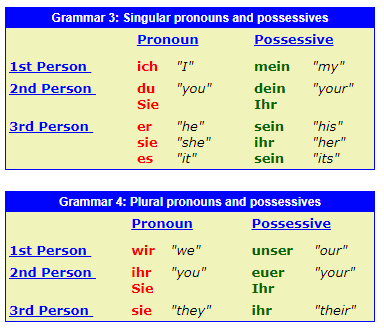1. We have already met some of the German pronouns and possessive adjectives in this chapter. The table below lists them in full:

The following points should be noted:
The German pronoun "ich" does not start with a capital letter, unlike its English equivalent "I".
Note that the pronoun "sie" can either mean "she" or "they" depending on context. And when it begins with a capital letter "Sie" is the formal form of "you"! Be very careful how you use this pronoun.
The word "ihr" can also pose difficulties. When used as a pronoun, it is the informal plural pronoun of "you". When used as a possessive adjective, it either means "her" or "their". And when it begins with a capital letter "Ihr" is the formal form of "your"!
The third person pronouns "er", "sie" and "es" can refer to persons. However they also substitute for all masculine, feminine and neuter nouns respectively, regardless of whether they are persons or things. The gender of German nouns will be explained fully in the next chapter.  英语
英语 日语
日语 韩语
韩语 法语
法语 西班牙语
西班牙语 意大利语
意大利语 阿拉伯语
阿拉伯语 葡萄牙语
葡萄牙语 越南语
越南语 俄语
俄语 芬兰语
芬兰语 泰语
泰语 丹麦语
丹麦语 对外汉语
对外汉语

